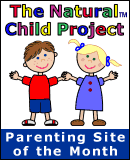| My
9-month-old daughter is allergic to both milk and dust. No one else
in the family has allergies. What causes them? When
your daughter was five months old, were you surprised that she
couldn't walk? Of course not! Her legs weren't coordinated yet.
We shouldn't be surprised if the immune system is also uncoordinated
in young children.
If your infant
has allergic tendencies, you want to keep her away from "foreign"
proteins in her diet for the first 12 months. This means staying
away from milk, eggs, and meat. When your pediatrician advises
solid foods, start with fruits and vegetables. When the baby is
at least seven months old, you can start slowly adding cereals
to the diet.
As the child gets
older, my advice is to keep her on this same diet, adding a greater
variety of fruits, vegetables (including beans), and grain products.
Children exposed to high-protein foods, especially during the
first year of life, have a greater susceptibility to allergies.
If your child is
a toddler and you suspect there are allergy problems with foods
such as chicken, dairy, wheat, eggs, or specific fruits or vegetables,
you can determine the culprit by removing the suspect food from
her diet. For a few days, feed the child only a limited number
of fruits and veggies. Then, add in the suspect foods one at a
time. This can be as accurate as the allergist's scratch test.
If you give a child some milk and she gets a stomach ache and
diarrhea, then stay away from milk.
Milk allergy is
the most common allergy I see in my office. Most people aren't
allergic to the lactose in milk. They're allergic to the protein.
That means it doesn't matter if the milk is nonfat or "lactose-reduced"
or that you only give your child a couple of teaspoons on her
cereal. It can take only a spoonful of milk to trigger an allergic
reaction which may include a runny nose, ear infection, intestinal
upset, or a rash. I recommend that your family not drink milk.
I consider it to be the number one allergen in our diet.
I would like to
emphasize here that we never see allergies to breastmilk. The
reason for this is breastmilk is custom-made for the human baby.
It fights infection and, if the mother is willing to pay careful
attention to her diet while nursing, there should be little or
no problem with digestion or gas. Breastmilk doesn't "awaken"
the immune system prematurely. If a child is allergic to cow's
milk, the mother will have to avoid eating dairy products because
their amino acid patterns will get into the breastmilk and cause
a reaction.
Another culprit
is eggs. I see a lot of children who are very sensitive to eggs.
Like milk, it's the protein that causes the problems. I believe
that eggs aren't a good food for anyone because of all the cholesterol,
fat, and contaminants.
Since allergies
play into one another, the more you can control the better. If
your child has an allergy to milk, wheat, dust, and pollen, you
may not be able to protect her from dust and pollen. However,
you can make her much healthier by eliminating wheat and milk.
The good news is that when children eat whole foods emphasizing
fruits, vegetables, and grains, you get many fewer allergies,
even in families with a history of sensitivity. |



